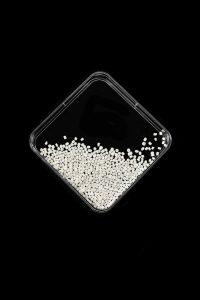
Scientists create new type of biodegradable plastic using reclaimed waste
Canadian Plastics
Materials Research & DevelopmentThe new substance, polyhydroxybutyrate, readily degrades in less than a year.

Compounded and granulated polyhydroxybutyrate (PHB). Photo Credit: Fraunhofer IPK
German researchers have developed an innovative process for making a new type of easily-degradable plastic.
The Fraunhofer Institute for Production Systems and Design Technology IPK, located in Berlin, and its partners have developed the technique, which creates a new type of plastic made of reclaimed waste which readily degrades in less than a year. The new substance, polyhydroxybutyrate (PHB) will soon serve to manufacture and break down mainly disposable products in an ecofriendly way – and the material can now be produced on an industrial scale with the recently developed method.
This new process turns industrial leftovers such as waste fats that contain a lot of mineral residue into PHB. Microorganisms can metabolize these residues in special fermentation processes and then deposit the PHB in their cells to store energy.
“Once the plastic has been dissolved from the cell, it is still not ready for industrial use, because the hardening process takes far too long,” said Christoph Hein, head of the Microproduction Technology department at Fraunhofer IPK. The raw material has to be mixed with chemical additives downstream in post-production stages. For example, the research team adjusted the plasticizing and processing parameters to trim the recrystallization time to fit the timing of industrial processing. The resulting biopolymer’s properties resemble those of polypropylene (PP). But unlike PP, this plastic degrades fully in six to twelve months.
In this method of producing plastic, microorganisms synthesize the entire polymer in a biotechnical process. “To this end, we convert biogenic residues such as waste fats into polyesters that can be put to technical use,” Hein said. The researcher and his team opted for microorganisms, genetically modified with molecular methods, to serve as biocatalysts. With the help of chemical purification processes and an extensively optimized material, they have been able to develop a novel family of materials that satisfy the demands of technical plastics.
The new process not only dispenses with petroleum-based synthetic components altogether; it also enables green plastic alternatives. Naturally occurring microorganisms can break down these newly developed plastics, so they don’t need to be subjected to the special conditions that serve to degrade matter in industrial composting plants. They offer an ecofriendly alternative to making and degrading single-use products and other disposable items.
The process also lends itself to producing high-quality plastic parts for certain technical applications and periods of use, the researchers said. “The specifications for this sort of product are more demanding,” Hein said. “They may have to exhibit specific geometric tolerances and surface qualities or be reproducible with great precision. [Our] replication processes meet these requirements.”
Source: Fraunhofer Institute for Production Systems and Design Technology IPK
